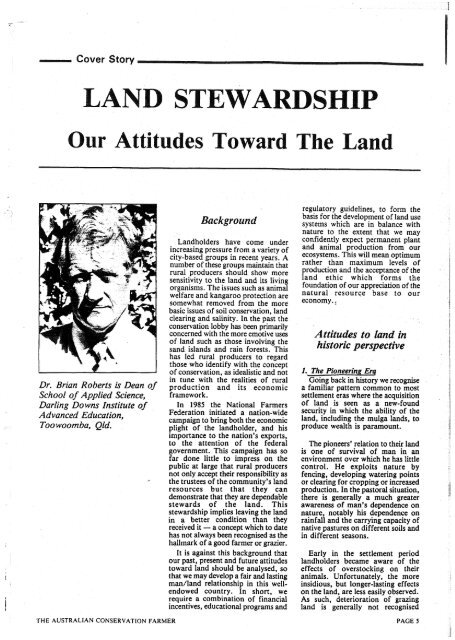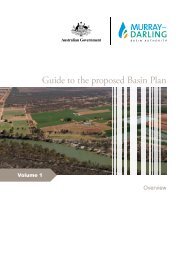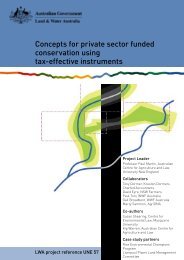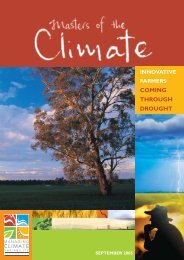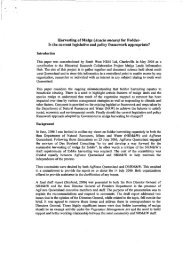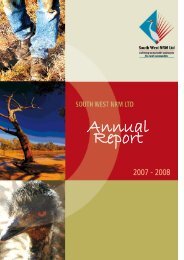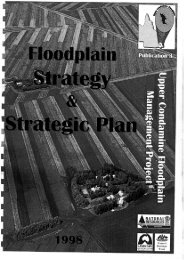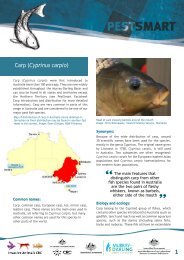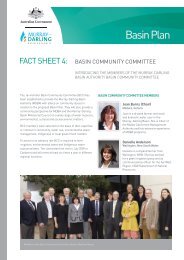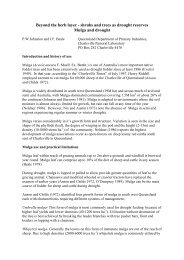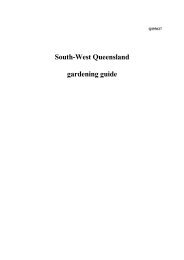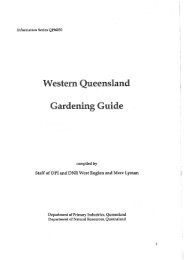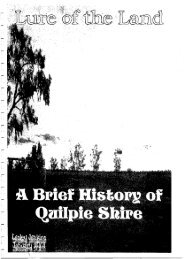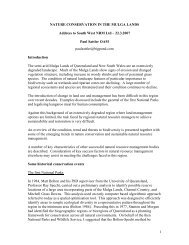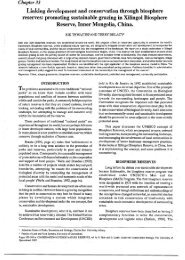soil-conservation-people-religion-and-land.pdf - South West NRM
soil-conservation-people-religion-and-land.pdf - South West NRM
soil-conservation-people-religion-and-land.pdf - South West NRM
You also want an ePaper? Increase the reach of your titles
YUMPU automatically turns print PDFs into web optimized ePapers that Google loves.
Cover Story<br />
LAND STE ARDSH<br />
udes Toward The L<strong>and</strong><br />
Dr. Brian Roberts is Dean of<br />
School of Applied Science,<br />
Darling Downs Institute of<br />
Advanced Education,<br />
Toowoomba, Qld.<br />
Background<br />
L<strong>and</strong>holders have come under<br />
increasing pressure from a variety of<br />
city-based groups in recent years. A<br />
number of these groups maintain that<br />
rural producers should show more<br />
sensitivity to the l<strong>and</strong> <strong>and</strong> its living<br />
organisms. The issues such as animal<br />
welfare <strong>and</strong> kangaroo protection are<br />
somewhat removed from the more<br />
basic issues of <strong>soil</strong> <strong>conservation</strong>, l<strong>and</strong><br />
clearing <strong>and</strong> salinity. In the past the<br />
<strong>conservation</strong> lobby has been primarily<br />
concerned with the more emotive uses<br />
of l<strong>and</strong> such as those involving the<br />
s<strong>and</strong> isl<strong>and</strong>s <strong>and</strong> rain forests. This<br />
has led rural producers to regard<br />
those who identify with the concept<br />
of <strong>conservation</strong>, as idealistic <strong>and</strong> not<br />
in tune with the realities of rural<br />
production <strong>and</strong> its economic<br />
framework.<br />
In 1985 the National Farmers<br />
Federation initiated a nation-wide<br />
campaign to bring both the economic<br />
plight of the l<strong>and</strong>holder, <strong>and</strong> his<br />
importance to the nation's exports,<br />
to the attention of the federal<br />
government. This campaign has so<br />
far done little to impress on the<br />
public at large that rural producers<br />
not only accept their responsibility as<br />
the trustees of the community's l<strong>and</strong><br />
resources but that they can<br />
demonstrate that they are dependable<br />
stewards of the l<strong>and</strong>. This<br />
stewardship implies leaving the l<strong>and</strong><br />
in a better condition than they<br />
received it - a concept which to date<br />
has not always been recognised as the<br />
hallmark of a good farmer or grazier.<br />
It is against this background that<br />
our past, present <strong>and</strong> future attitudes<br />
toward l<strong>and</strong> should be analysed, so<br />
that we may develop a fair <strong>and</strong> lasting<br />
man/l<strong>and</strong> relationship in this wellendowed<br />
country. In short, we<br />
require a combination of financial<br />
incentives, educational programs <strong>and</strong><br />
regulatory guidelines, to form the<br />
basis for the development of l<strong>and</strong> use<br />
systems which are in balance with<br />
nature to the extent that we may<br />
confidently expect permanent plant<br />
<strong>and</strong> animal production from our<br />
ecosystems. This will mean optimum<br />
rather than maximum levels of<br />
production <strong>and</strong> the acceptance of the<br />
l<strong>and</strong> ethic which forms the<br />
foundation of our appreciation of the<br />
natural resource base to our<br />
economy. :<br />
Attitudes to l<strong>and</strong> in<br />
historic perspective<br />
1.<br />
Going back in history we recognise<br />
a familiar pattern common to most<br />
settlement eras where the acquisition<br />
of l<strong>and</strong> is seen as a new-found<br />
security in which the ability of the<br />
l<strong>and</strong>, including the mulga l<strong>and</strong>s, to<br />
produce wealth is paramount.<br />
The pioneers' relation to their l<strong>and</strong><br />
is one of survival of man in an<br />
environment over which he has little<br />
control. He exploits nature by<br />
fencing, developing watering points<br />
or clearing for cropping or increased<br />
production. In the pastoral situation,<br />
there is generally a much greater<br />
awareness of man's dependence on<br />
nature, notably his dependence on<br />
rainfall <strong>and</strong> the carrying capacity of<br />
native pastures on different <strong>soil</strong>s <strong>and</strong><br />
in different seasons.<br />
Early in the settlement period<br />
l<strong>and</strong>holders became aware of the<br />
effects of overstocking on their<br />
animals. Unfortunately, the more<br />
insidious, but longer-lasting effects<br />
on the l<strong>and</strong>, are less easily observed.<br />
As such, deterioration of grazing<br />
l<strong>and</strong> is generally not recognised<br />
THE AUSTRALIAN CONSERVATION FARMER PAGE 5


